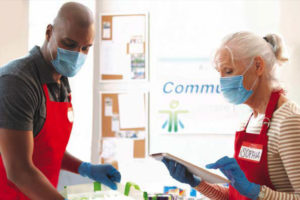Volunteer Safety

Volunteers are vital to the survival of many
charitable organizations. Without people
willing to offer their time and expertise free of
charge, many nonprofits would find it difficult, if not
impossible, to meet their missions.
The global pandemic that began in late 2019
and continued into 2021 changed many aspects
of life as the world knew it, and that includes
volunteering. Social distancing measures and stayat-
home mandates from state and local governments
discouraged people from leaving their homes, while
various health organizations warned aging men and
women to stay home as much as possible. The Centers
for Disease Control and Prevention notes that the risk
for severe illness from COVID-19 increases with age.
In recognition of that threat, many retirees who were
heavily involved in volunteering prior to the pandemic
were forced to cease working as volunteers, which could
have a negative effect on their mental health as the pandemic
continues. A report from the Mayo Clinic Health System noted
that adults over age 60 experienced greater life satisfaction and
greater positive changes in their perceived health as a result of
volunteering.
Many people have continued to volunteer during the
pandemic or getting back to their volunteer activities now that
more people are getting vaccinated. Those that want to do so can
take these steps to make sure their efforts to give back are as safe
as possible.
· Speak with your physician first. Anyone, but especially
seniors, who wants to volunteer during the pandemic should
discuss those aspirations with their physicians prior to offering
their services to charitable organizations. Doctors can discuss
the acute and chronic threats posed by the COVID-19 virus and
examine each individual’s medical history to help potential
volunteers decide if working with a local charity is safe. In
addition, seniors to make sure they receive the COVID-19
vaccine. Doctors can also check patients for COVID-19
symptoms and even have them tested to make sure they won’t
be putting anyone in danger should they decide to volunteer.
· Contact the organization prior to volunteering. Some
organizations may not be allowing potentially at-risk volunteers
to perform in-person tasks. Contact the organization you hope
to work with prior to signing up to confirm your eligibility,
but also to discuss the safety protocols they’ve put in place to
protect the health of their volunteers.
· Monitor your own health. If you’ve signed up to
volunteer, it’s vital that you monitor your own health. Health
officials believe the COVID-19 virus has spread so rapidly
for a number of reasons, including the likelihood that
many people have had the virus but shown no symptoms.
Charitable organizations will no doubt assess the health of
each volunteer when they show up to work, but volunteers
also should make such assessments on their own. Check
your temperature each day and familiarize yourself with the
symptoms of COVID-19. If you suspect you are unwell or are
even slightly under the weather, contact the charity and tell
them you won’t be showing up that day. Operating with an
abundance of caution during the pandemic can save lives.
· Consider virtual volunteering. Virtual volunteering is a
safe way to give back that won’t expose volunteers or others
to the COVID-19 virus. Charitable organizations need behindthe-
scenes help just as much as they need volunteers with
their boots on the ground. Virtual volunteers can help with
fundraising efforts and event planning, but also help charities
overcome the logistical challenges of operating and meeting
their missions during the pandemic.
Prior to volunteering during the pandemic, prospective
volunteers can follow numerous steps to ensure volunteering is
safe, both for them and the people they’re trying to help.

